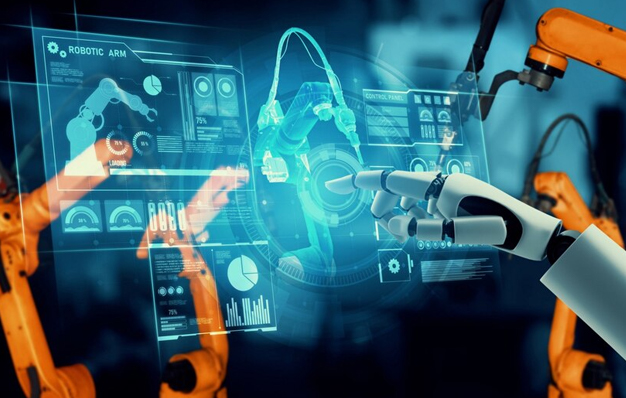The retail landscape is in the throes of a digital revolution, propelled by groundbreaking technologies that are reshaping consumer interactions, optimizing operations, and driving revenue growth. At the heart of this transformation lies Artificial Intelligence (AI), an omnipresent force driving unprecedented efficiency and innovation across every facet of the retail sector.
The Rise of AI in Retail
The journey towards digital maturity in retail has been marked by the integration of advanced data analytics, predictive technologies, and the Internet of Things (IoT). However, it’s the advent of AI that has truly unlocked the potential of these capabilities, propelling retailers into an era where data-driven decision-making isn’t just a competitive advantage—it’s a necessity.
Recent estimates suggest that AI has contributed a staggering $40 billion in additional revenue to the retail sector over just three years. This seismic shift underscores the pivotal role AI now plays in the success and sustainability of retail enterprises worldwide.
The Imperative of AI Adoption
To remain competitive in this rapidly evolving landscape, retailers must embrace AI-driven strategies. By the year 2020, it was projected that 85% of enterprises would have integrated AI into their operations. This adoption rate underscores a critical reality: failure to leverage AI risks irreparable market share loss and diminished competitiveness in an increasingly tech-driven marketplace.
Understanding AI in Retail
When we speak of AI in retail, we’re referring to a suite of technologies encompassing machine learning, predictive analytics, and autonomous systems. These tools empower retailers to collect, process, and analyze vast volumes of data with unparalleled precision, yielding actionable insights that inform strategic decision-making.

AI doesn’t merely analyze data—it acts autonomously, leveraging advanced analytics to transform raw information from IoT sensors and other sources into strategic business intelligence. By harnessing behavioral analytics and customer intelligence, AI empowers retailers to enhance customer experiences, optimize supply chains, and drive revenue growth through personalized engagements.
Transformative Applications of AI in Retail
The impact of AI on retail extends far beyond theoretical concepts—it’s revolutionizing day-to-day operations and consumer interactions. Let’s explore how AI is reshaping the retail landscape through practical applications:
1. Inventory Management
AI-driven demand forecasting harnesses marketplace, consumer, and competitor data to predict industry shifts and optimize marketing, merchandising, and supply chain strategies. This proactive approach enhances operational efficiency and minimizes stockouts.
2. Adaptive Homepage
Digital portals leverage AI to recognize individual customers and tailor online experiences based on their preferences, purchase history, and browsing behavior. This hyper-personalization enhances engagement and drives conversion rates.
3. Dynamic Outreach
Advanced CRM systems utilize AI to analyze consumer behavior and preferences, enabling retailers to deliver personalized marketing campaigns, recommendations, and content that resonate with individual customers.
4. Interactive Chat
AI-powered chatbots enhance customer service by addressing queries, providing product recommendations, and guiding purchasing decisions. These bots streamline interactions while gathering valuable consumer insights.
5. Visual Curation
Algorithmic engines translate real-world browsing behaviors into digital retail opportunities by facilitating image-based searches and curating product recommendations based on aesthetics and user preferences.
6. Guided Discovery
Automated assistants leverage AI to guide customers through product selections based on their needs, preferences, and fit, fostering confidence and driving conversion.
7. Conversational Support
AI-driven conversational assistants employ natural language processing to address customer inquiries and troubleshooting, providing seamless support and enhancing the overall shopping experience.
8. Personalization & Customer Insights
AI-powered retail spaces recognize and adapt to individual customers’ profiles and preferences, delivering tailored experiences and enhancing customer satisfaction.
9. Emotional Response
AI interfaces analyze facial, biometric, and audio cues to gauge shoppers’ emotions and deliver personalized product recommendations or support, ensuring meaningful interactions.
10. Customer Engagement
IoT-enabled technologies enable retailers to glean valuable insights into consumer behavior, preferences, and trends, facilitating enhanced customer engagement and satisfaction.
11. Operational Optimization
AI-driven logistics management systems optimize inventory, staffing, distribution, and delivery in real time, ensuring efficient supply chain operations and meeting consumer expectations.
12. Responsive R&D
Deep learning algorithms analyze customer feedback and purchasing data to inform product and service development, ensuring alignment with consumer preferences and market demands.
13. Demand Forecasting
AI-powered business intelligence tools forecast industry shifts and guide proactive adjustments to marketing and merchandising strategies, optimizing business outcomes.
14. Customized Selections
AI-driven personalization enables retailers to offer unique, tailored experiences that resonate with individual consumers, fostering loyalty and driving revenue growth.
The Strategic Imperative for AI in Retail
Beyond operational efficiency and revenue growth, AI offers retailers five key strategic advantages:
- Customer Engagement: AI enables retailers to deliver personalized, immersive shopping experiences that captivate and retain customers in a hyper-competitive marketplace.
- Innovation Leadership: By leveraging predictive analytics, retailers can lead with innovation, offering differentiated products and services that anticipate and exceed consumer expectations.
- Data-Driven Insights: AI transforms disparate data into actionable consumer insights, empowering retailers to develop consumer-centric strategies.
- Unified Shopping Experience: AI facilitates seamless integration of offline and online retail channels, eliminating friction and enhancing customer satisfaction.
- Agile Logistics: AI-driven logistics networks enable retailers to adapt rapidly to shifting consumer demands, ensuring flexibility and efficiency across supply chains.
Partnering for Success with QeDatalab
Implementing AI solutions can be daunting, but with a trusted technology partner like QeDatalab, retailers gain access to comprehensive support and guidance throughout the implementation journey. From strategy development to post-deployment support, QeDatalab empowers retailers to unlock the full potential of AI, driving growth and innovation in a dynamic retail landscape.
Conclusion
The retail industry stands at a crossroads, where AI-driven innovation is not merely a competitive advantage but a strategic imperative. By embracing AI, retailers can create immersive, personalized shopping experiences that captivate consumers and drive sustained growth. As the retail landscape continues to evolve, those who harness the power of AI will emerge as leaders in a new era of retail excellence.




